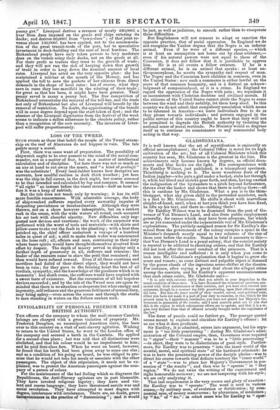INVIOLABILITY OF PERSONAL FREEDOM UNDER BRITISH AUTHORITY.
Wm officers of the company to whom the mail-steamer Cambria belongs are charged with a gross violation of propriety. Mr. Frederick Douglass, an emancipated American slave, has been over to this country on a visit of anti-slavery agitation. Wishing to return to the United States, he went to the London office of the company and secured a berth in the Cambria. He applied for a second-class place ; but was told that all distinctions were abolished, and that his colour would be no impediment to him; and he paid first-class fare. When he went on board, however, he found that his berth had been given away to some one else ; and as a condition of his going on board, he was obliged to pro- mise that he would not take his meals or associate with the other passengers. The object of this stipulation, it needs not be ex- plained, was to protect the American passengers against the com- pany of a person of colour. For the maintenance of the bad feeling which so disgraces the Republicans, the Anti-Slavery agitators are in part blameable. They have invoked religious bigotry ; they have used vio- lent and coarse language; they have threatened servile war and social revolution. They have attempted to meet dogma with dogma, intolerance with intolerance. There are, no doubt, grave Inconveniences in the practice of " fraternizing " ; and it would
be just, as well as judicious, to smooth rather than to exasperate those difficulties.
But Englishmen will not consent to adopt or sanction the opposite practice, that of social oppression. In England we do not recognize the Yankee dogma that the Negro is an inferior animal. Even if he were of a different species, — which is at least an assumption not borne out by clear evidence,— even if his natural powers were not equal to those of the Caucasian, it does not follow that it is justifiable to oppress him. He is at all events a fellow creature. If he is a different animal, he is an animal that speaks : at least an- thropomorphous, he merits the sympathy and respect of man. The Negro and the Caucasian have children in common, even in the United States : now such a commerce is either lawful on the score of that common humanity, and is a fortiori an acknow- ledgment of companionhood, or it is a crime. In England we regard the oppression of the Negro with pain; we repudiate it as inconsistent with Christian doctrine and civilized morals. If the citizens of the United States cannot abide the Negro to come between the wind and their nobility, let them keep aloof. In this country we do not admit that compulsory association which seems to be tolerated in America—we leave individuals free to do as they please towards individuals ; and persons engaged in the public service of this country ought to know that they will not be permitted to degrade the British authority by violating the national sense of moral rectitude. No Ministry would so disgrace itself as to continue its countenance to any commercial body acting in that way.


























 Previous page
Previous page